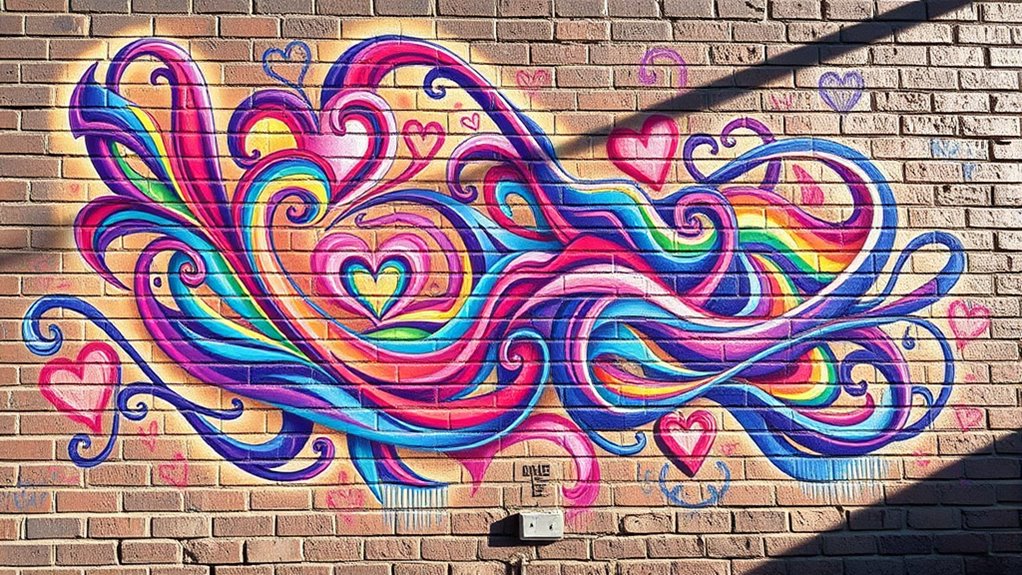LGBTQ+ literature has redefined romance by sharing powerful lines that honor authentic love beyond stereotypes. These words highlight deep emotional connections, celebrate diversity, and challenge traditional norms, revealing love’s true complexity and beauty. Lines like “stars collided in perfect harmony” or “hearts beat to a different rhythm” deepen emotional resonance and normalize LGBTQ+ relationships. If you explore further, you’ll discover even more unforgettable expressions that transform how romance is seen and felt.
Key Takeaways
- They use poetic, cosmic imagery to elevate LGBTQ+ love beyond stereotypes, showcasing its depth and beauty.
- These lines challenge heteronormative narratives, emphasizing authentic, nuanced queer relationships.
- Romantic language in such literature normalizes LGBTQ+ experiences by highlighting vulnerability, joy, and longing.
- They reflect shared human desires for connection, acceptance, and understanding across diverse identities.
- These lines redefine romance as an expansive, inclusive force that celebrates love’s universality.

Have you ever found a line in literature that perfectly captures the complexity and beauty of LGBTQ+ experiences? These lines do more than just tell a story; they redefine how we comprehend love and identity through powerful queer representation and romantic language. Such moments offer a window into lives that challenge societal norms, celebrating love in all its forms with honesty and grace. When authors craft these lines, they create a space where LGBTQ+ voices are not only heard but cherished, transforming the way romance is depicted in literature. These words serve as a mirror for many, reflecting their truths and affirming their experiences.
LGBTQ+ stories illuminate love’s true diversity, reflecting authentic experiences with honesty, grace, and powerful romantic language.
What makes these lines stand out is their ability to intertwine romantic language with authentic queer representation. They move beyond stereotypical portrayals, instead showcasing the depth and nuance of LGBTQ+ relationships. For example, a line that describes a same-sex love as “a universe where our stars collided in perfect harmony” does more than paint a picture; it elevates the experience to something cosmic and profound. Such language captures the emotional intensity and tenderness inherent in queer love, emphasizing that it’s as rich, complex, and beautiful as any other form of romance. These lines challenge the heteronormative narratives often seen in mainstream literature, carving out space for stories that celebrate love without limits or constraints.
By highlighting moments of vulnerability, longing, and joy, these lines help normalize LGBTQ+ relationships and experiences. They serve as a reminder that love, in all its expressions, is universal. When you encounter a line like “our hearts beat to a different rhythm, yet somehow it’s the same song,” it resonates deeply because it speaks to the shared human longing for connection, acceptance, and understanding. Such romantic language doesn’t just describe love; it elevates it, imbues it with meaning, and invites you to see love through a new lens. These carefully crafted lines have the power to inspire, comfort, and validate, making the stories they come from more relatable and impactful.
Ultimately, these lines from LGBTQ+ literature redefine romance by emphasizing authenticity, emotion, and representation. They remind us that love isn’t confined by gender or societal expectations but is an expansive, beautiful force that unites us all. When you read them, you’re invited into a world where love is celebrated in all its forms, where queer voices are at the forefront, and where romantic language lifts these stories to new heights of expression. They challenge us to rethink what romance can be and to embrace the diversity of human experience with open hearts.
Frequently Asked Questions
How Has Lgbtq+ Literature Influenced Mainstream Romance Genres?
You can see how LGBTQ+ literature has profoundly influenced mainstream romance by introducing authentic queer representation. This has driven genre evolution, encouraging more diverse stories and characters. Your reading choices now include richer, more inclusive narratives that challenge traditional notions of love. As a result, mainstream romance has become more open-minded, reflecting real-world relationships and expanding your understanding of love beyond heteronormative ideals.
Which Authors Are Considered Pioneers in Lgbtq+ Romantic Literature?
Think of queer trailblazers as guiding stars in literature. Pioneering authors like James Baldwin, Audre Lorde, and Jeanette Winterson broke barriers, reshaping love stories with authenticity and courage. They challenged stereotypes and expanded what romance could be, inspiring countless others. Their work paved the way for more diverse narratives, proving that love’s spectrum is wide and wonderful. If you’re exploring LGBTQ+ romantic literature, these trailblazers are essential chapters in that story.
What Are Some Common Themes in Lgbtq+ Romantic Poetry?
You’ll notice that LGBTQ+ romantic poetry often explores themes like identity exploration and emotional vulnerability. These poems encourage you to reflect on discovering your true self and embracing authentic feelings. They challenge traditional notions of love, emphasizing personal growth and acceptance. By sharing raw emotions and personal journeys, these poems foster connection, inspiring you to understand and celebrate diverse love stories beyond societal norms.
How Do Lgbtq+ Stories Challenge Traditional Relationship Stereotypes?
You see how LGBTQ+ stories challenge traditional relationship stereotypes by emphasizing identity exploration and breaking gender roles. These narratives show that love isn’t limited by societal expectations, allowing you to explore authentic self-expression. They often highlight diverse relationship dynamics, proving that romantic fulfillment isn’t confined to conventional norms. By doing so, they inspire you to embrace your true self, fostering acceptance and expanding understanding of what love and relationships can be.
What Role Does Intersectionality Play in Redefining Romance in Lgbtq+ Literature?
Like a modern Odysseus maneuvering unfamiliar waters, you see intersectionality as vital in redefining romance in LGBTQ+ literature. It intertwines identity politics and cultural narratives, highlighting diverse experiences beyond traditional roles. This approach enriches stories, showing unique love journeys that challenge stereotypes and broaden understanding. You recognize that embracing intersectionality allows literature to authentically reflect complex identities, creating deeper emotional connections and inspiring change in societal perceptions of love.
Conclusion
You realize these lines are like sparks igniting new ways to see love—bold, honest, and unapologetic. They remind you that romance isn’t one-size-fits-all; it’s a vibrant tapestry woven with courage and authenticity. Just as a rainbow brightens the sky after a storm, these words uplift and redefine what love can be. Embrace their power, and let them inspire you to see love’s endless possibilities with open eyes and an open heart.









